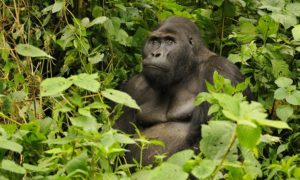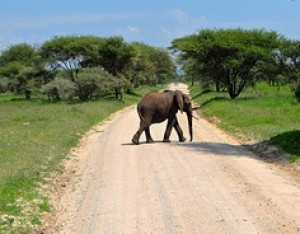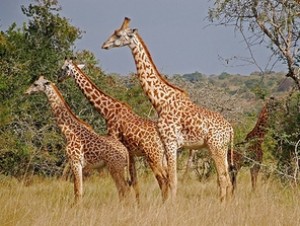Gorillas stand in way of Uganda ,DR Congo oil.
The Government stopped illegal mining of gold, logging and encroachment that were pushing Bwindi to her knees.

Gorilla
The fact that part of the landscape where the mountain gorillas stay in Uganda and neighbouring DR Congo is sitting on oil, has led to two questions: Should the gorillas be dispersed in order to extract the oil or should the oil and the gorillas just be? The two countries do not agree.
Tourists buy different products from the local residents and which also earns income.This is part of the impact of gorilla tourism
Three decades ago, Bwindi Impenetrable National Park was a worthless bush. But, Bwindi has turned into a lifeline for the local communities, as well as the endangered mountain gorillas estimated at about 800 in number globally.
The Government stopped illegal mining of gold, logging and encroachment that were pushing Bwindi to her knees. Today, the money from gorilla tourism is making up for the revenue from the destructive use of Bwindi which has also brought up jobs to tour operators like Travel Hemispheres leading to gorilla safaris which can also be combined with wildlife safaris.
While the Government took a step in favour of conservation, the discovery of oil in parts of Lake Edward and Queen Elizabeth, is beginning to bite the environment. The area, referred to as Ngaji, is part of the Greater Virunga that covers parts of Bwindi, Mgahinga Gorilla National Park in Uganda and Rwanda as well as DR Congo.
The part in Queen Elizabeth National Park is part of the only remaining migratory corridor between Uganda and DR Congo. Lake Edward is at the heart of a chain of lakes, including Lake George and Albert.
The three lakes are connected by Kazinga Channel between Lake George and Edward and River Semliki links Edward to Albert. This is part of the catchment for River Nile that flows through Lake Albert on its way from Lake Victoria to the Mediterranean Sea.
This is, sadly, the area where oil exploration is now being proposed. Exploitation is set to beat conservation. The risk of an oil spill alone is enough danger to the water in the Nile, which will be contaminated to cause destruction of habitats for many migratory species, including fish and birds.
The wildlife based tourism in the Albertine rift, which is one of the most important ecological regions globally will be no more.

Elephant
However, government officials argue that this is not the first time that oil exploration is taking place in an ecologically sensitive area. They insist that restoration done in Murchison Falls National Park shows that mining of oil could co-exist with wildlife.
“As long as we ensure that oil activities do not pollute the environment. “The entire Albertine Graben is an area of high environmental concern, with Murchison Falls National Park, Kabwoya wildlife reserves and others. Those organisations should stop politicking and understand that exploration work can go on without damaging the environment.”

Giraffe
Giraffes have been seen grazing in a place that has been restored after the oil exploration in the northern part of Murchison Falls National Park
A decade ago, Uganda discovered commercial quantities of oil. With only 40% of the Albertine rift (the western arm of the rift valley) explored, Uganda’s oil assets are estimated at 6.5 billion barrels and is likely to increase with further licensing for exploration.
DR Congo strategy
However, across the border, DR Congo has opted to leave the oil and preserve the Virunga landscape. The activists, together with the international community, have fought to keep Virunga intact. Consequently, a British company, known as SOCO, has withdrawn interest in undertaking exploration activities in the part of Virunga in DR Congo.
The same pressure could be mounting on the Ugandan government. In the recently concluded round of licencing by the Ugandan Government, private companies declined to take interest in oil exploration activities in the Ngaji block, which is located in the park.
The Virunga is a complex ecological system with chains of tropical rainforests punctuated with lakes, such as Edward; savanna plains and
it is also a transboundary park. This means that the impacts in DR Congo are likely to spill over in Uganda and the reverse is true.
“Uganda is a sovereign state, but it will have to ensure that the impacts do not spill over to DR Congo,” advising that Uganda and DR Congo should get a common stand on oil.

